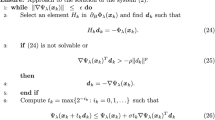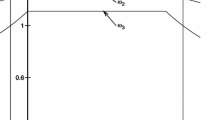Abstract
Convergence is established for iterative algorithms for the solution of the nonsymmetric linear complementarity problem of findingz such thatMz+q⩾0,z⩾0,z T(Mz+q)=0, whereM is a givenn×n real matrix, not necessarily symmeetric, andq is a givenn-vector. It is first shown that, if the spectral radius of a matrix related toM is less than one, then the iterates generated by the general algorithm converge to a solution of the linear complementarity problem. It turns out that convergence properties are quite similar to those of linear systems of equations. As specific cases, two important classes of matrices, Minkowski matrices and quasi-dominant diagonal matrices, are shown to satisfy this convergence condition.
Similar content being viewed by others
References
Hildreth, C.,Point Estimates of Ordinates of Concave Function, Journal of the American Statistical Association, Vol. 49, pp. 598–619, 1954.
Christopherson, D. G.,A New Mathematical Method for the Solution of Film Lubrication Problems, Institute of Mechanical Engineers, Proceedings, Vol. 146, pp. 126–135, 1941.
Cryer, C. W.,The Method of Christopherson for Solving Free Boundary Problems for Infinite Journal Bearings by Means of Finite Differences, Mathematics of Computation, Vol. 25, pp. 435–443, 1971.
Mangasarian, O. L.,Solution of Symmetric Linear Complementarity Problems by Iterative Methods, Journal of Optimization Theory and Applications, Vol. 22, pp. 465–485, 1977.
Ahn, B. H.,Computation of Market Equilibria for Policy Analysis: The Project Independence Evaluation System (PIES) Approach, Garland Publishing Company, New York, New York, 1979.
Mathiesen, L.,Efficiency Pricing in a Linear Programming Model: A Case of Constraints on the Dual Variables, Stanford University, Stanford, California, Operations Research Report No. 74-18, 1974.
Varga, R. S.,On Recurring Theorems on Diagonal Dominance, Linear Algebra and Its Applications, Vol. 13, pp. 1–9, 1976.
Ortega, J. M., andRheinboldt, W. C.,Iterative Solution of Nonlinear Equations in Several Variables, Academic Press, New York, New York, 1970.
Cottle, R. W., Golub, G. H., andSacher, R. S.,On the Solution of Large Structured Linear Complementarity Problems, III, Stanford University, Stanford, California, Operations Research Report No. 73-8, 1973.
Cryer, C. W.,The Solution of a Quadratic Programming Problem Using Systematic Over-relaxation, SIAM Journal on Control, Vol. 9, pp. 385–392, 1971.
Fiedler, M., andPtàk, V.,On Matrices with Non-Positive Off-Diagonal Elements and Positive Principal Minors, Czechoslovak Mathematical Journal, Vol. 12, pp. 382–400, 1962.
Moré, J. J.,Classes of Functions and Feasibility Conditions in Nonlinear Complementarity Problems, Mathematical Programming, Vol. 6, pp. 327–338, 1974.
Tamir, A.,The Complementarity Problem of Mathematical Programming, Case Western Reserve University, Cleveland, Ohio, PhD Thesis, 1973.
Author information
Authors and Affiliations
Additional information
Communicated by O. L. Mangasarian
The author is grateful to Professor O. L. Mangasarian and the referees for their substantive suggestions and corrections.
Rights and permissions
About this article
Cite this article
Ahn, B.H. Solution of nonsymmetric linear complementarity problems by iterative methods. J Optim Theory Appl 33, 175–185 (1981). https://doi.org/10.1007/BF00935545
Issue Date:
DOI: https://doi.org/10.1007/BF00935545




